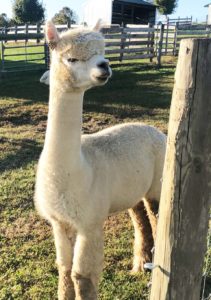 Angelica Good, The Yellow Jacket
Angelica Good, The Yellow JacketThe Lippencott Alpaca Farm in Greene County, Pennsylvania welcomes visitors every day from 9 a.m. through 6 p.m. by chance or by appointment.
The alpaca farm opened in 2005 with five female alpacas. Male alpacas were added for breeding years later after visiting various other farms. Within the last two years, Lippencott acquired a herdsire — a male alpaca with desirable breeding characteristics — for their female alpacas.
“The girls that we have now are better than average and are superior quality alpacas,” said Lena Galing, fourth generation farm owner.
The farm began with quantity instead of quality but now prides itself on maintaining quality opposed to quantity. Most of the alpacas are now white and white fawn.
“The main reason is that I saw our very first alpaca at our very first sheep and fiber fest in Waynesburg and that’s what did it; it was love at first sight,” Galing said.
Lena and her husband Philip Galing have been attending seminars and visiting farms ever since. Another function the Lippencott Farm maintains is a farm store with products that are hand-made with their alpaca fur, referred to as fiber.
“Not all farms have farm stores. I enjoy doing this because it lets people know – okay here is the animal now what do you do with it,” Galing said. “…It’s mainly about touching. You have got to touch alpaca to believe how soft it is and believe that there are six grades of fiber.”
For example, baby alpaca have the finest alpaca fiber: grade one. Grade two would include yarn and grade three consists of socks. The higher the grade, the better insulation the fiber becomes. Their motto is, “We’re all about keeping warm.”
“What makes alpaca famous is it wicks away the moisture from your feet, from your hands and from a hat for example. They have done scientific studies, and the water actually is laying on top of the sock or glove,” Galing said. “So, your feet are dry; therefore, your feet are warm. Making alpaca superior to sheep, doing a better job.”
The goal is to have fine but dense fiber because it is the most useful. Alpaca fiber is three times warmer than wool with less bulk but the same insulation, said Galing. It lacks stiff guard hairs to reduce itchiness and are considered to be almost indestructible. Items made with alpaca fiber are made to last a lifetime if taken care of properly by being washed in cold water and never being subject to heat.
The Galing’s also own several Great Pyrenees dogs that live outdoors alongside the alpacas in order to protect them from coyotes. Besides keeping the alpacas safe from coyotes, the daily upkeep of alpacas is not difficult. They eat grass and good quality hay all year round.
“We do pet them. We only pet them on the neck, the front of the neck, the back of the neck, in between their ears and right at the top of the backbone. That’s it. You don’t want to place your hand on the top of their head because they will pull back. That’s where they get to be attacked,” Galing said. “Yes, they kick, spit and bite but not at people unless people are doing something nasty to them.”
The only time the alpacas get upset is when they are sheared once a year for a few minutes. Once sheared, a process must be done in order to create something with the fiber.
“By the time I put it in a big screen, you have to skirt it, sort it and grate it,” said Galing.
With 22 natural colors, alpaca fiber allows potential for lots of beautiful and warm creations.
Alpaca shows take place quite often. Galign explained they travel with the intent of learning more and winning a purple ribbon to bring home.
“There are several hundreds all over the United States. Mainly, we go to York County and the Harrisburg area. We have been to Virginia, Tennessee, Ohio, New York and more,” Galing said.
Lippencott Alpaca Farm always hosts an open house the last full weekend of September. They welcome all to come to enjoy various activities and fun on the farm. Just one visit to the farm will leave you smiling, educated and wanting to return for more.
